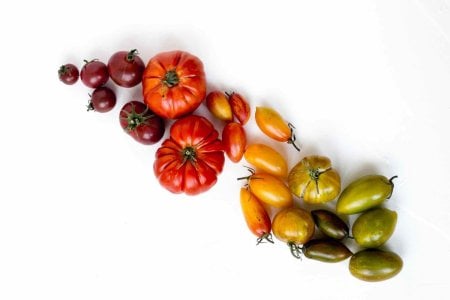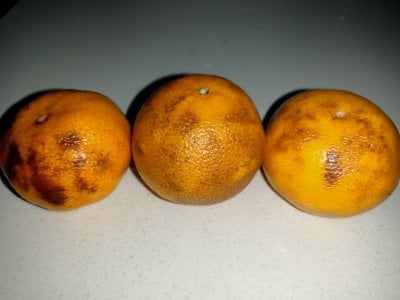Pomegranate predicament: Growers' frustration bears fruit for imperfect produce distributor
- Replies 16
In the lush Goulburn Valley of Victoria, a grower stares out over a sea of pomegranates, a crop that should have been a source of pride and profit.
Instead, it's become a symbol of the harsh realities of modern agriculture and the stringent standards of supermarket aesthetics.
Like many others, this grower has found himself unable to sell 20,000 kilograms of pomegranates to supermarkets, not because of taste or nutritional value, but due to 'purely aesthetic' damage caused by an unexpected summer hail storm.
The hail in January left small blemishes on the skin of the young fruit, which, despite being perfectly edible, meant that about half of the crop would not meet the supermarkets' standards for appearance.
This is a common story in the agricultural industry, where the pursuit of perfection often leaves perfectly good food without a market.
Another farmer in the same region reported 'dumping' around 30 tonnes of tomatoes daily due to minor issues like ‘slight discolouration, size issues, and blemishes on the skin’.

While both Woolworths and Coles stated they did not reject the produce, the reality is that the growers themselves chose not to present their fruits for sale, anticipating the likely rejection based on past experiences.
Fortunately, not all of this produce goes to waste.
Farmers Pick, an 'imperfect' fruit and vegetable distributor, stepped in to save all of the pomegranates and half of the tomatoes that would otherwise be destined for landfill.
Since its establishment in 2020, Farmers Pick has rescued three million kilograms of produce from 50 growers across Australia, selling them in home-delivered fresh produce boxes.
Co-founder Josh Ball voiced the frustrations of growers.
‘I think the farmers have been constantly squeezed over the past decade to make more beautiful fruit while trying to make the unrealistic beauty standards set for them,’ he stated.
‘Oranges for example, if they have got a blemish that's bigger than five per cent of the fruit on the skin, then they're rejected.’
‘And that'll be the reason why it'll be in a Farmers Pick box and not on a supermarket shelf,’ he added.
He also mentioned that Farmers Pick did not accept fruits and vegetables that were inedible, and the produce only exhibited ‘purely aesthetic’ damages.
‘It doesn't affect the taste, which is the most confusing part,’ Mr Ball said.
He added that the situation would become increasingly difficult due to climate change and the rising occurrence of natural disasters.
Farmers Pick attributed its rapid growth to its direct sourcing from farmers, which allowed it to ‘cut a few steps in the supply chain’ and offer customers prices approximately 30 per cent lower than those in supermarkets.
‘I think with the cost of living, people are being forced to really think about how they're doing their shopping, buying their food, and how they're eating,’ Mr Ball said.
A spokesperson from Coles stated that the company endeavours to fulfil customers' expectations regarding the quality of its produce.
‘We work very closely with our growers to determine the approximate quantities of produce we expect to purchase ahead of time, so we can give customers confidence that they will be able to buy in-season produce at great prices,’ the spokesperson said.
‘It also gives growers the confidence to grow crops with certainty they will be able to meet demand while not creating an oversupply.’
‘When entering agreements with our growers, we decide on specifications ahead of time,’ they added.
A spokesperson from Woolworths mentioned that they regularly assess their produce standards with suppliers to guarantee that the fruits and vegetables supplied to their stores meet customer expectations.
‘Our produce requirements are adaptable and respond to the quantity and availability of fruit and vegetables in the market, which is affected by seasonality, supply, and weather,’ the spokesperson said.
‘This allows us to work with growers to meet customer demand, while also reducing food waste from unsold fruit and veg in our stores.’
An ALDI spokesperson stated that their market buy range was described as ‘open spec’.
‘This means that the fruit delivers the same quality taste, but may be of different shapes and sizes, or have little blemishes that make them less beautiful, but just as delicious,’ they said.
‘Beyond this, there are a number of ways ALDI supports its grower partners including long-term partnerships, last-minute specials created in partnership to support growers to sell excess produce following favourable growing conditions, as well as changing pack or produce sizing and cosmetic markings requirements into support market conditions and reduce waste.’
From scrutinising the quality of fruits to exploring value buys, Australians are increasingly conscious of their grocery choices.
While these discussions continue, savvy shoppers are discovering overlooked treasures that offer incredible value for their wallets.
As consumers navigate through these considerations, they are eager to uncover hidden gems that not only meet their budgetary needs, but also deliver quality and satisfaction.
 Have you encountered 'imperfect' produce in your shopping experiences? Would you be willing to buy blemished but tasty fruits and vegetables if it meant supporting local growers and reducing waste? Share your thoughts and experiences in the comments below.
Have you encountered 'imperfect' produce in your shopping experiences? Would you be willing to buy blemished but tasty fruits and vegetables if it meant supporting local growers and reducing waste? Share your thoughts and experiences in the comments below.
Instead, it's become a symbol of the harsh realities of modern agriculture and the stringent standards of supermarket aesthetics.
Like many others, this grower has found himself unable to sell 20,000 kilograms of pomegranates to supermarkets, not because of taste or nutritional value, but due to 'purely aesthetic' damage caused by an unexpected summer hail storm.
The hail in January left small blemishes on the skin of the young fruit, which, despite being perfectly edible, meant that about half of the crop would not meet the supermarkets' standards for appearance.
This is a common story in the agricultural industry, where the pursuit of perfection often leaves perfectly good food without a market.
Another farmer in the same region reported 'dumping' around 30 tonnes of tomatoes daily due to minor issues like ‘slight discolouration, size issues, and blemishes on the skin’.

Farmers lamented supermarkets' strict beauty standards, citing that even minor imperfections cause rejection. Credits: Farmers Pick
While both Woolworths and Coles stated they did not reject the produce, the reality is that the growers themselves chose not to present their fruits for sale, anticipating the likely rejection based on past experiences.
Fortunately, not all of this produce goes to waste.
Farmers Pick, an 'imperfect' fruit and vegetable distributor, stepped in to save all of the pomegranates and half of the tomatoes that would otherwise be destined for landfill.
Since its establishment in 2020, Farmers Pick has rescued three million kilograms of produce from 50 growers across Australia, selling them in home-delivered fresh produce boxes.
Co-founder Josh Ball voiced the frustrations of growers.
‘I think the farmers have been constantly squeezed over the past decade to make more beautiful fruit while trying to make the unrealistic beauty standards set for them,’ he stated.
‘Oranges for example, if they have got a blemish that's bigger than five per cent of the fruit on the skin, then they're rejected.’
‘And that'll be the reason why it'll be in a Farmers Pick box and not on a supermarket shelf,’ he added.
He also mentioned that Farmers Pick did not accept fruits and vegetables that were inedible, and the produce only exhibited ‘purely aesthetic’ damages.
‘It doesn't affect the taste, which is the most confusing part,’ Mr Ball said.
He added that the situation would become increasingly difficult due to climate change and the rising occurrence of natural disasters.
Farmers Pick attributed its rapid growth to its direct sourcing from farmers, which allowed it to ‘cut a few steps in the supply chain’ and offer customers prices approximately 30 per cent lower than those in supermarkets.
‘I think with the cost of living, people are being forced to really think about how they're doing their shopping, buying their food, and how they're eating,’ Mr Ball said.
A spokesperson from Coles stated that the company endeavours to fulfil customers' expectations regarding the quality of its produce.
‘We work very closely with our growers to determine the approximate quantities of produce we expect to purchase ahead of time, so we can give customers confidence that they will be able to buy in-season produce at great prices,’ the spokesperson said.
‘It also gives growers the confidence to grow crops with certainty they will be able to meet demand while not creating an oversupply.’
‘When entering agreements with our growers, we decide on specifications ahead of time,’ they added.
A spokesperson from Woolworths mentioned that they regularly assess their produce standards with suppliers to guarantee that the fruits and vegetables supplied to their stores meet customer expectations.
‘Our produce requirements are adaptable and respond to the quantity and availability of fruit and vegetables in the market, which is affected by seasonality, supply, and weather,’ the spokesperson said.
‘This allows us to work with growers to meet customer demand, while also reducing food waste from unsold fruit and veg in our stores.’
An ALDI spokesperson stated that their market buy range was described as ‘open spec’.
‘This means that the fruit delivers the same quality taste, but may be of different shapes and sizes, or have little blemishes that make them less beautiful, but just as delicious,’ they said.
‘Beyond this, there are a number of ways ALDI supports its grower partners including long-term partnerships, last-minute specials created in partnership to support growers to sell excess produce following favourable growing conditions, as well as changing pack or produce sizing and cosmetic markings requirements into support market conditions and reduce waste.’
From scrutinising the quality of fruits to exploring value buys, Australians are increasingly conscious of their grocery choices.
While these discussions continue, savvy shoppers are discovering overlooked treasures that offer incredible value for their wallets.
As consumers navigate through these considerations, they are eager to uncover hidden gems that not only meet their budgetary needs, but also deliver quality and satisfaction.
Key Takeaways
- A Victorian grower was unable to sell 20,000 kilograms of pomegranates to supermarkets due to 'purely aesthetic' damage caused by hail.
- Farmers expressed frustration with the beauty standards imposed by supermarkets, stating that even small blemishes lead to rejection of the produce.
- Farmers Pick, a distributor of 'imperfect' fruit and vegetables, saved large quantities of produce from ending up in landfills by providing a market for aesthetically damaged but edible products.
- Supermarkets responded by detailing their quality expectations and efforts to work with growers, with some alternatives being offered such as ALDI's market buy range for less than perfect produce.








